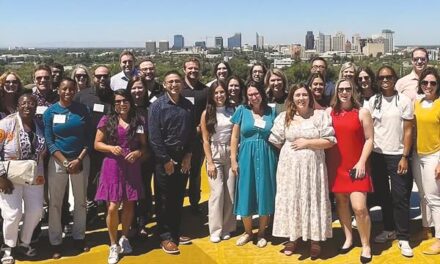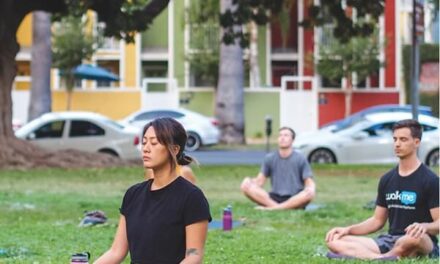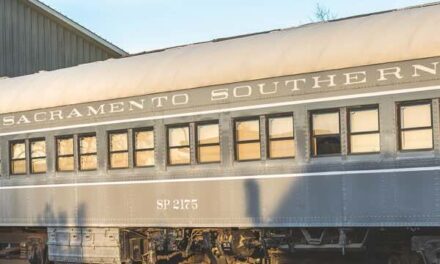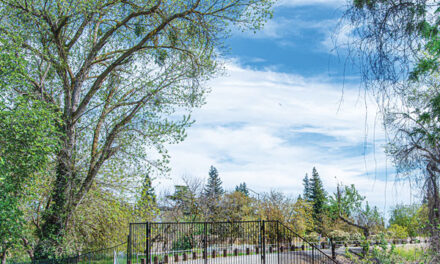Out & About
By Jessica Laskey
August 2022

Here’s To You
Firehouse owner leaves lasting legacy
Lloyd Harvego, owner of the iconic Firehouse Restaurant, passed away June 13.
“He was an extraordinary husband, father, grandfather, business and community leader, and dear friend,” his family said in a statement.
In the 1990s, Harvego bought The Firehouse Restaurant in its distinctive brick building in Old Sacramento. It’s since become one of the city’s favorite fine dining locations, with a wine list that will make your tongue dance and a beautiful outdoor patio that’s been the site of countless weddings.
Harvego was always keen on sharing his success—his extensive philanthropy efforts touched many organizations.
When I was just starting my professional acting career at Sacramento Theatre Company, I delivered the curtain speech before each performance. In thanking our sponsors, the Harvego Family Foundation was always first on the list.
The foundation made dozens of our productions possible. For that, I and the rest of the Sacramento community are eternally grateful.
OUTDOOR DINING
The city’s temporary Al Fresco Dining program put in place during the pandemic to keep local eateries afloat became permanent July 1.
The program now allows owners to build formal patios through a streamlined permitting process to “make it easy for local restaurant owners to create safe, durable and beautiful patios in public right-of-way,” says Matt Eierman, the city’s parking manager.
Restaurant owners can browse, choose and customize free engineered layouts on the new permitting webpage at sacpark.org. Applicants will then work with the city to formalize their plans and secure a revocable permit. A formal grant program will launch soon using funds from the American Rescue Plan Act to help offset construction costs and establish city fees.
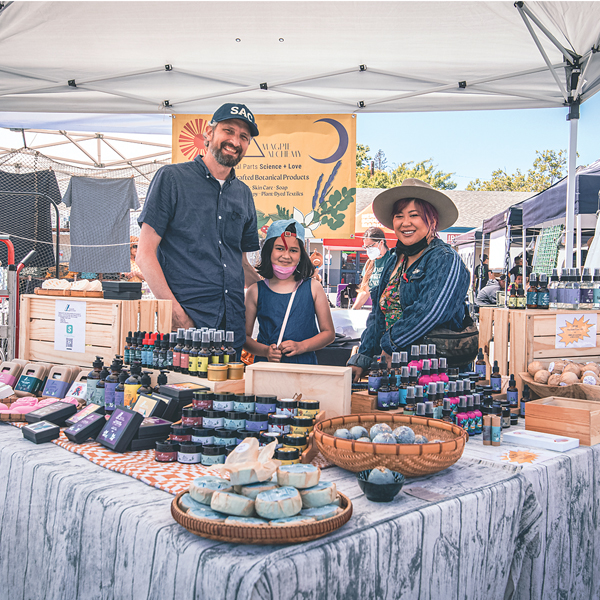
NEIGHBOR MARKET
Unseen Heroes has launched a new NeighborGood Market in East Sacramento, open every Sunday from 8 a.m. to 1 p.m. at David Lubin Elementary School.
Unseen Heroes launched its first NeighborGood Market in Elk Grove in September 2020 as a way to bolster local small businesses that were hurting from the pandemic and safely bring people together to celebrate the good things in life—friends, family, neighbors, food, music and more.
The market was so popular that Unseen Heroes launched the East Sac market and a third in West Sacramento outside Sutter Health Park.
The family-friendly East Sac market features fresh produce and flowers from local farmers, one-of-a-kind gifts from talented artisans, weekend brunches and pour-over coffee. The market also directly supports David Lubin’s S.T.E.A.M. education program.
Now that’s #whatsgood. For more information, visit unseen-heroes.com.
GREEN FLEET
Sacramento County’s Fleet Services Division won three awards this year for its innovation and drive toward cleaner, greener operations.
Sacramento County was named the No. 1 Leading Public Fleet at the Advanced Clean Transportation Expo Fleet Awards, No. 3 Best Fleet of 2022 by the NAFA Fleet Management Association, and No. 5 leading fleet from Government Fleet and the American Public Works Association at the Government Fleet Expo and Conference.
“The county has 2,800 vehicles in its fleet,” says Keith Leech, chief of the Fleet Services Division and Parking Enterprise. “By converting more than 60 percent of our total fuel consumption to renewable fuels and transitioning to advanced hybrid electric technology, we have significantly reduced our carbon footprint while achieving significant ongoing savings in fuel costs.”
The Fleet Services Division is currently partnering with SMUD to eventually transition the county’s entire fleet to zero-emission electric vehicles.
CLEAN PARKS
To keep our parks as clean as possible, Sacramento County’s Department of Regional Parks, Waste Management and Save the American River Association have partnered to replace trash barrels in county-owned parks along the American River Parkway.
The partnership is part of the second phase of Regional Parks’ “Keep Parks Clean” campaign to encourage parkway visitors to protect natural resources by responsibly disposing of their waste.
Last year, 100 waste barrels were replaced along the parkway, with another 100 to be replaced over the coming months.
SCHOOL MURALS
There are 40 new murals in town. Wide Open Walls unleashed a team of creatives at Tahoe Elementary School on 60th Street during this year’s WOW festival.
The creators hope the murals will have a positive impact on the neighboring community, and the attitude and mental health of students, while turning the campus into a place of beauty.
WOW will continue its mural-making initiative at area schools during future festivals. For more information, visit wideopenwalls.com.
ANIMAL HOUSE
Plan to attend one of the region’s most popular art shows, Animal House, celebrating the beauty and intelligence of animals through oil, acrylic, watercolor, ceramic and more.
This annual juried exhibit is showing at Sacramento Fine Arts Center in Carmichael now through Saturday, Aug. 13, when a Second Saturday Reception will be held 5:30–8:30 p.m. For more information, visit sacfinearts.org.
ARTS FELLOWSHIP
Five area artists from a range of disciplines have been awarded the Gloria Burt Sacramento Region Arts Fellowship.
The fellowship, named in honor of late beloved arts advocate Gloria Burt, is a joint project of Sacramento Alliance for Regional Arts, Blue Line Arts and Sacramento Region Community Foundation.
Jaya King will collaborate with youth artists from Wellspring Women’s Center to create a large community mural in Oak Park. Omari Tau will work with students from Los Rios community colleges and other collaborators to film a micro-opera that explores the demands of families, jobs and personal needs.
Melissa Muganzo Murphy will premiere a documentary exploring the history of obstetrics and gynecology research and practice in relation to Black and LGBTQ+ communities. Teresa Forsyth will develop and perform a play examining historical events in Placer County. Amee Evans Godwin will partner with American River Conservancy and Arts & Culture El Dorado to explore wildfire through visual art and recorded interviews.

ART WALK
The Third Saturday Art Walk in Downtown Roseville is fun way to support local artists, musicians, farmers, nonprofits and artisans selling original handcrafted items. This year’s final art walks are Aug. 20 and Sept. 17 from 5–9 p.m.
Vernon Street is closed to traffic creating a walkable outdoor corridor for four city blocks. Each event features a public art project, such as mural painting, chalk art competitions, art demonstrations and mixed-media activities for all ages.
Stop by Blue Line Arts gallery to view the current exhibition. Enjoy live music up and down Vernon Street, as well as local food trucks.
Free parking is available in the garage next to Blue Line Arts and on surrounding streets. For more information visit bluelinearts.org/3rdsaturdays.
SCHOOL BACKPACKS
Volunteers of America’s annual Operation Backpack launched last month with a goal of providing 9,000 local students with school supplies for the upcoming school year.
The campaign includes in-person collections hosted by local groups, as well as an online component. With support from donors and businesses, school supplies are distributed directly to students living in shelters, foster homes and low-income housing.
“I have seen year after year the relief that Operation Backpack provides to students in need,” says Christie Holderegger, VOA vice president and chief development officer. “Knowing they have all the supplies they need to be successful allows students to focus on their studies and flourish.”
Last year, more than 6,000 students in Northern California and Northern Nevada received a new backpack filled with school supplies. For more information, visit voa-ncnn.org/backpack.
VET ADOPTIONS
In a win for both military veterans seeking companion animals and shelter pets needing homes, veterans are eligible for waived adoption fees at our public animal shelters.
Under California’s Pets for Vets Act, individuals with a valid driver’s license or ID card with the word “VETERAN” printed on it will have adoption fees waived.
Licensing and other fees may apply depending on the shelter. Adoptions under this program are limited to one dog and one cat every six months. Potential adopters still receive standard adoption counseling to ensure a good match between the animal and person.
To adopt, visit the county’s Bradshaw Animal Shelter or the city’s Front Street Animal Shelter. For information on adopting, donating or volunteering, visit animalcare.saccounty.gov or frontstreeetshelter.org.
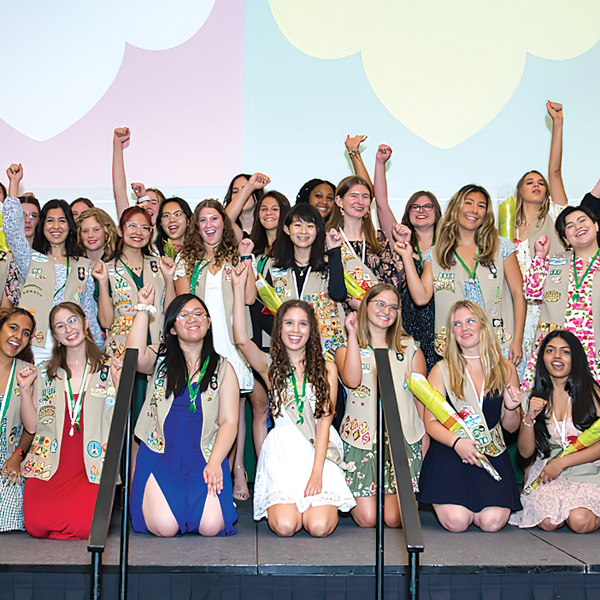
GOLD AWARDS
Forty-five Girl Scouts from Girl Scouts Heart of Central California, including 12 from the Sacramento area, were awarded the Gold Award, the organization’s highest achievement recognizing girls who have created sustainable change in their communities and beyond.
This year’s class tackled topics such as the historical women at the Sacramento Historic City Cemetery, ecological importance of urban bat communities and effect of excessive screen time on schoolchildren. Other projects included podcasts to fight mental health stigma and promote anti-racism curriculum for high school students.
“By earning the Gold Award and doing good work for their communities, these girls have inspired others to do the same,” says Girl Scouts Heart of Central California CEO Dr. Linda Farley.
CHOIR SINGERS
Sacramento Valley Concert Choir is looking for singers for its community choir. The group has performed in Sacramento for more than 50 years and welcomes all voices, male and female, especially altos, tenors and basses.
Rehearsals are every Tuesday from 7–9 p.m. from Sept. 6 through Dec. 20 at Arden Christian Church. Current COVID protocols are observed. For more information, visit svcchoir.org.

OLD SAC SIGN
The Old Sacramento Waterfront has added a bright new sign to its skyline—the largest LED sign of this size and scope in the region.
At more than 20 feet tall, the $250,000 sign is clearly visible on I-5 from its perch atop the California State Railroad Museum.
The sign was custom-designed by Sacramento-based Pacific Neon Company using an environmentally friendly neon alternative. The privately funded project was made possible through the Downtown Sacramento Foundation in partnership with various local businesses and organizations.
“This vibrant and eye-catching new LED sign celebrates the Old Sacramento Waterfront as the heart of our city,” says Michael Ault, executive director of Downtown Sacramento Partnership. “The iconic sign will serve as an inviting landmark to literally and figuratively elevate Sacramento’s profile as the center of innovation, commerce, connectivity and culture for our region.”
LA FAMILIA
The City Council recently approved $2 million to develop La Familia Counseling Center’s latest community project, the Opportunity Center.
Located on Franklin Boulevard, the center will provide multicultural services—including a career center and computer lab, parenting classes, health and mental health resources, employment services and collaborative spaces—to the South Sacramento community. The project is expected to break ground by the end of the year.
La Familia also recently received a $700,000 grant from the Outdoor Equity Program to fund a Juntos Afuera program, which will offer 49 activity days of outdoor leadership activities, career pathway exploration, environmental justice education and family-centered excursions for 900 participants over three years. For more information, visit lafcc.org.
JOB TRAINING
The City Council has approved a $15 million plan to provide job training, paid internships and workforce readiness training to thousands of Sacramentans between the ages of 16 and 30.
The plan is set to start in September and will focus on economically marginalized and at-risk people. It will include job coaching, paid internships through city programs like #SacYouthWorks and Thousand Strong, and job placement in various sectors. The plan also will include neighborhood career navigators at public libraries to help connect people to services, training and jobs.
Funding will come from the state’s new Californians For All program (approximately $7 million), mid-year budget (about $5 million) and American Rescue Plan Act ($2.75 million).
LABOR DIVERSITY
A new report released by the city auditor sheds light on the diversity of the city’s workforce—and where we can improve.
The report analyzes employee trends from 2016 through 2021. The percentage of Hispanic or Latino and Asian employees in both non-management and management positions has increased, while the percentage of White and Black or African American employees in both of those categories decreased. Encouragingly, the percentage of women in management positions increased from 34 percent to 40 percent.
“The city recognizes that to meet our workforce equity goal requires ongoing, sustained and systemic effort that commits to engaging with staff, leadership and stakeholders throughout the organization,” city staff wrote in a letter to the auditor.
To help meet that goal, the city’s Diversity and Equity Manager Aimée Zenzele Barnes launched the Race & Gender Equity Action Plan to increase the employment, retention and promotion of people of color and women; improve communication; provide best practices resources for hiring managers to increase equity; and develop partnerships to move workforce equity forward.
FOOD SECURITY
The City Council has allocated $1.5 million from the American Rescue Plan Act to address food insecurity in Sacramento: $1 million for a grant program supported by the Food Justice Task Force and $500,000 to bolster ongoing food distribution through Sacramento Food Bank & Family Services.
The Food Justice Task Force, led by Mayor Darrell Steinberg and Councilmember Mai Vang, seeks to increase access points to healthy food in high-need communities and invest in our local food system economy.
With the new funding, Sacramento Food Bank & Family Services will purchase approximately 371,900 pounds of food—which equates to about 310,000 meals—to distribute through its partner network of more than 150 food banks, local shelters and community-based organizations.
In April, the food bank and its partners served more than 213,570 individuals—a 42-percent increase from pre-pandemic numbers.
“The funding has been instrumental in getting us through the pandemic and this additional support comes at a time where we are seeing demand levels continue to rise as inflation adds another layer of challenge,” says food bank President/CEO Blake Young.
BASIC INCOME
United Way California Capital Region’s Direct Investment Program is expanding thanks to $750,000 in American Rescue Plan Act dollars allocated by the City Council.
The additional funding will expand the number of families receiving guaranteed basic income from 100 to 180, providing 80 new families with $500 in unconditional guaranteed income every month for one year. (The current program is providing 100 families with $300 a month for two years.)
“To truly end poverty, we must have meaningful policy changes at the local, state and federal level,” says Dr. Dawnté Early, president/CEO of United Way California Capital Region. “The city of Sacramento is making the choice to address poverty directly by giving community members the money they need to meet their basic needs—housing, food cost and child care, for example.”
United Way’s Direct Investment Program is the region’s first guaranteed income program. Seventy-two percent of participants are women and people of color, and one in three participants is working multiple jobs. The program aims to invest in 1,000 families by 2025.
Jessica Laskey can be reached at jessrlaskey@gmail.com. Submissions are due six weeks prior to the publication month. Follow us on Facebook, Twitter and Instagram: @insidesacramento.



